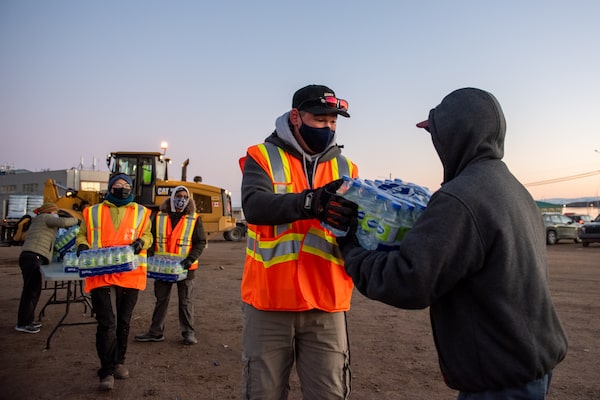
City of Iqaluit staff and volunteers hand out bottles of water for residents on Oct. 15.Pat Kane/The Globe and Mail
When Maggie Aqpik saw the Facebook posts about Iqaluit’s water, she thought she better check her own home. She turned on her tap, lowered her nose to the faucet “and sure enough, I didn’t even have to really get close, I could already smell it.”
Ms. Aqpik, a 30-year-old mother of three girls, was one of the many Iqaluit residents who detected diesel-like fumes in her water up to ten days before Nunavut’s capital declared a local state of emergency on Oct. 12. City officials warned residents against consuming water from their taps that same day, saying that even boiling the water wouldn’t guarantee its safety.
The smell is expected to linger and get stronger, the city warned this weekend, as workers flush the water lines to clean out the contaminants, a process that will continue into the week.
Iqaluit confirms contaminated water tank
Meanwhile, the city will conduct an environmental assessment of the ground and soil in the area of the local water-treatment plant as it continues to investigate the source of the contamination, and hopes that the water will be safe to drink later this week.
Last Friday, Iqaluit said it had identified high concentrations of hydrocarbons, consistent with diesel fuel or kerosene, in samples from the plant. The in-ground water tank the samples came from has since been isolated from the system.
Nunavut’s Chief Public Health Officer, Michael Patterson, said Friday that the tests didn’t turn up any carcinogens or other chemicals known to cause long-term damage to human health. However, some people who drank Iqaluit’s water before the do-not-consume order have reported headaches and vomiting, Dr. Patterson said.
Outside Iqaluit’s Nakasuk Elementary School on Saturday, a steady stream of residents pulled up in trucks, ATVs and taxis to pick up the allotted one case of bottled water per household.
“It’s been a little bit stressful,” Jackie Dook said after she grabbed her case. She has been brushing her teeth and washing her dishes with boiled river water. “It brings to mind the First Nations who have been living like this for years and years. We’re just going through it for a week.”
The night before the city issued its do-not-consumer order, Ms. Aqpik’s partner, Walter, brushed his teeth with tap water. Afterward, he felt ill and vomited, Ms. Aqpik said. Despite the slight diesel odour of the tap water, he reflexively gulped down a cup of it.
“This was before they put out the announcement, so he drank the water and as soon as he did that, he got even more sick,” Ms. Aqpik said. “He was home for the whole night.”
Ms. Aqpik said her partner recovered quickly from his illness.
Since then, the family has relied on jugs of water from the Sylvia Grinnell River and bottled water that the city is handing out by the case. Her daughters’ school was closed for three days. Out of an abundance of caution, Ms. Aqpik hasn’t had a bath since the night before the emergency was declared.
Chief Wayne Moonias of Neskantaga First Nation – a Northern Ontario community that has been under a boil-water advisory for 26 years, the longest in the country – said he hopes Iqaluit gets the support and action they need to resolve their water crisis.
“That’s what people need regardless where you live, what color of skin, what you believe in, you should be able to access clean, safe drinking water.”
Mr. Moonias said his community members deal with not only physical effects like skin rashes and reactions from bathing and showering in unsafe tap water but there’s also the mental-health toll on generations of people who not only distrust their own water, but don’t trust the tap water when they are out of the remote community in places like Thunder Bay, for example.
“There’s trauma, ongoing mental-health issues,” he said. “The healing and the work will be something we’ll have to deal with for the longest time.”
While water and sewage infrastructure in First Nations such as Neskantaga are a federal responsibility under Indigenous Services Canada, Iqaluit is a municipality struggling with high water rates that cannot address its aging infrastructure, which needs replacing.
City council members have said it will cost more than $100-million to upgrade its water and sewage system.
Our Morning Update and Evening Update newsletters are written by Globe editors, giving you a concise summary of the day’s most important headlines. Sign up today.
 Willow Fiddler
Willow Fiddler Kelly Grant
Kelly Grant